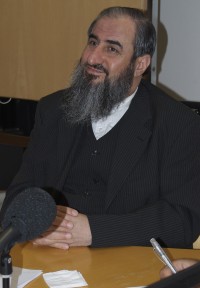A court in Oslo will decide on Friday whether Mullah Krekar can be banished to a small village in central Norway until he can be deported. Norway’s police intelligence agency PST still considers Krekar a threat to national security.

The court heard arguments on both sides yesterday over whether Krekar, who just finished serving a prison term for making threats against two Kurds and Erna Solberg before she became prime minister, can wander freely in Norway. Police intended to immediately place him at an asylum center in Kyrksæterøra in Trøndelag, but his longtime defense attorney Brynjar Meling quickly filed an appeal.
That allowed Krekar to go home to his family in Oslo until his court appearance on Tuesday, which received massive media attention. The court had been expected to rule quickly, but took the arguments under advisement until Friday. Krekar thus won another reprieve and remains free at least until then and likely longer: Meling has vowed to fight the banishment order to Kyrksæterøra all the way to the Supreme Court if necessary.
Officials at PST (Politiets sikkerhetstjeneste), meanwhile, testified that they’d seized documents from Krekar’s jail cell in Kongsvinger in which he’d written about “liquidations.” Krekar spent his time in prison handwriting his interpretations of Islamic law, some of which have landed him in trouble before. Krekar has told reporters, for example, that anyone who insults Islam can be killed (“with an axe on the street, if necessary”) and that those defying Islam can justifiably be punished as well.
Meling demanded to see the seized documents, reportedly written in Kurdish, while Krekar claimed PST was lying. PST claims other documents seized are tied to the establishment of a terror network in Germany.
Avoided questions about the use of violence
Police fear that Krekar, who came to Norway as a refugee, can influence young Muslims and claim that since Krekar represents a threat to national security he should be confined, or at least moved as far from Oslo as necessary to make it difficult for followers to meet him face to face.
News bureau NTB reported that Krekar avoided direct questions about his views on the use of violence. He referred to the brutal terrorist group IS (Islamic State) as being “like all other organizations,” and he wouldn’t clarify his views on the use of violence to achieve political goals. He claimed that things he’s said before, both under police questioning and in the media, have been misinterpreted or taken out of context.
Asked how he views IS’ extreme use of violence to reach political and religious goals, Krekar said that had “positive and negative sides. But I don’t know, I haven’t met them. I don’t know them.”
He did talk about a Kurdish network called Rawt where he apparently has a leadership role. “We only talk about a vision, about how we must understand Islam and modern life and Kurdistan’s situation,” Krekar said, confirming that the network may develop into a Kurdish political party. PST thinks Rawt can develop into a terror network.
The judge in the case needed to consult frequently with both legal counsel, regarding which laws were being applied since Krekar’s case has no legal precedent. A ruling was due Friday afternoon.
newsinenglish.no/Nina Berglund

